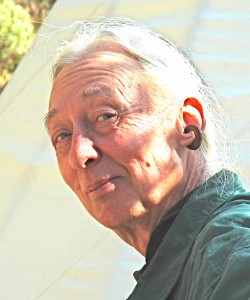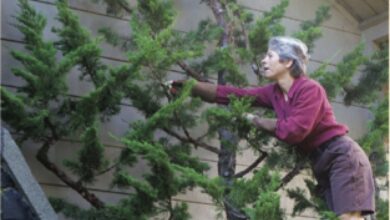Tom Ward, Permaculture Teacher and Counselor
 Tom Ward has been practicing and teaching permaculture in southern Oregon for almost 30 years. He is a well known character in permaculture circles throughout the northwest. Tom holds a vast reservoir of scientific and historical knowledge, practical experience, colorful stories and thoughtful philosophy which he shares with students, audiences and friends. He advises many local organic farms and manages a social forestry experimental station where he is demonstrating natural building, fuel hazard materials utilization, multiple products woods-crafting, wildlife enhancement and desert forest water management.
Tom Ward has been practicing and teaching permaculture in southern Oregon for almost 30 years. He is a well known character in permaculture circles throughout the northwest. Tom holds a vast reservoir of scientific and historical knowledge, practical experience, colorful stories and thoughtful philosophy which he shares with students, audiences and friends. He advises many local organic farms and manages a social forestry experimental station where he is demonstrating natural building, fuel hazard materials utilization, multiple products woods-crafting, wildlife enhancement and desert forest water management.
Tom teaches the Permaculture Design Course, as well as advanced courses attended by students from throughout the west coast. He is the author of Greenward Ho! Herbal Home Remedies: An Ecological Approach to Sustainable Health.
One of reasons I like going to your talks is because you’re a storyteller. Why do you use storytelling in your teaching?
Stories weave threads together. Whole systems is a sort of mapping and so is a story; you’re taking a voyage, going on a walk through ideas. When hearing a story, you can feel yourself in that place. Then you’ll have a better memory and remember more things if you learn them in a story. Whole system mapping helps us wrap our minds around all the aspects of a challenge so that we can discover and sometimes precipitate a useful idea.
Permaculture uses whole systems mapping with a systematic surveying of opportunities and necessities, and that’s why they call it a design methodology, not a recipe book. It teaches everyone to think for themselves.
So what is permaculture, anyhow?
We already have all the tools and all the solutions we need, we just don’t know how to apply them appropriately. Permaculture maps out the patterns and the principles; and then helps us to know where to go to find the answers. By having studied many indigenous knowledge systems as well as many scientific fields, permaculture has come to understand that there’s a universal set of patterns that repeat themselves over and over again everywhere.
What is your career or your job description? Why do you call yourself a counselor not a consultant?
I help people take their home, homestead or small farm and develop a much higher degree of integrity because we’ve used design to rearrange all the activities and the parts of their place to avoid unnecessary labor. I see myself as a facilitator, and thus I call myself a counselor. I want to support people who are the ones that actually live at the place being assessed. In the end my clients feel that they’ve designed the place themselves. That is wonderful for me because then they own the design; they don’t think I dictated it to them.
Do you also apply ethical principles to these arrangements?
Permaculture does not have ethics; it recognizes the common ethics that are held by some cultures. Ethics belong to people living in place. This is what we’ve found: care for the earth, care for people and redistribute the surplus are ethics that are found in cultures that have achieved sustainability in the place where they live.
You offer a service called a “permaculture walk-through”. What do you do on the walk-through?
I have a checklist of sit elements which we discuss and on which I offer information and counseling including solar access, locations for gardens, orchards and animals, rainwater catchment, frost drainage, pooling, soil regeneration, soil fertility, wind and storm protection, natural home heating, cooling and air quality, energy efficiency, native plants, edible landscaping, use of local materials, natural building, fire protection, fuels reduction, secondary forest products and relative location of elements.
Are the people you’re counseling mostly farmers?
I’ve lived in this bioregion a long time. I’ve been involved in nonprofits, churches, neighborhoods, and I’m not always preaching permaculture, just acting like a neighbor. My professional experience is that farmers make the best use of my advice; they take it and they apply it. Farming is the career of the future. We need a decentralized, localized, biologically based, and stable food production system.
We’re doing this for survival reasons. The way we are living now is not sustainable and is falling down around us right now. Our opportunity here is to use the remnants of this failed civilization to build a new way of living on this planet; the only planet we’ve got.
So is permaculture going to save the world?
No, people are going to save the world. All the great ideas that permaculture uses to illustrate the use of principles and patterns are borrowed ideas, observed ideas which we found in the successful human cultures that do exist on the planet.
What kind of people come to your courses?
People are coming because they have property or a home and want to take steps to be more sustainable, or they’re seeking information to help them find a good place to make a resilient and regenerative life. Everyone I’ve met seems to know we have problems as a civilization; and there aren’t a lot of good answers. Permaculture doesn’t have all the answers, but we’ve thought hard about how to find those answers, and that process is called design.
==================================================
2012 UPDATE:Envisioning a Permanent Culture for the Rogue Valley
Wednesday, November 7th
An Evening with Tom Ward
7:00-9:00 pm
Science Works, 1500 East Main
By Donation, no one turned away==================================================
For more information contact Melanie 541-482-7909 or sassetta@mind.net.
Tom Ward is a member of Siskiyou Permaculture. Along with Melanie Mindlin and Karen Taylor, they offer courses, counseling and design services.
http://sites.google.com/a/mind.net/siskiyou-permaculture/courses-and-events
Article by: Melanie Mindlin




